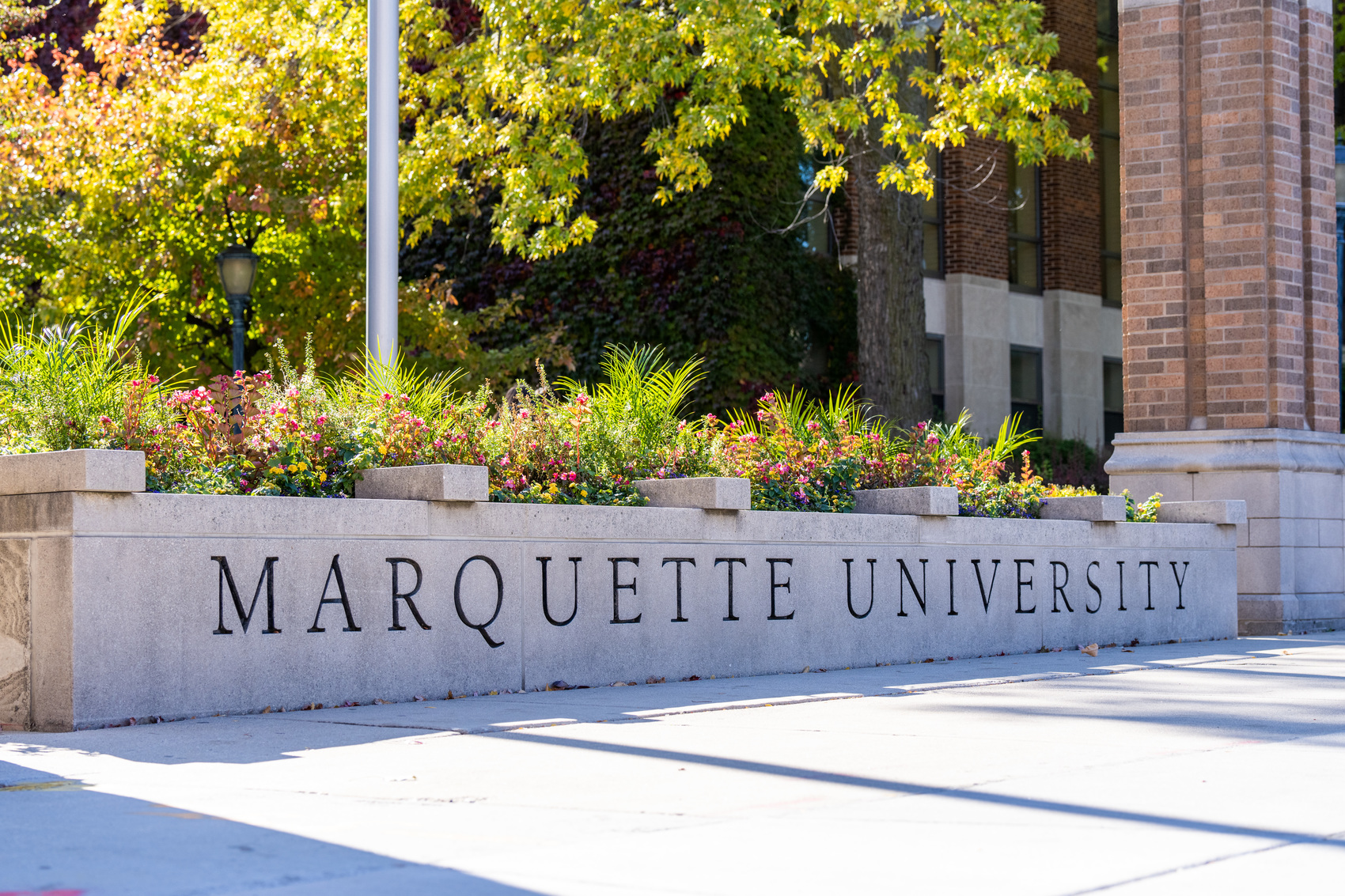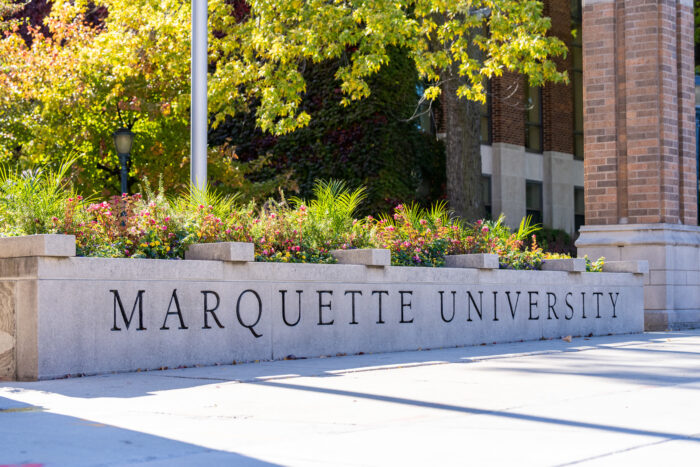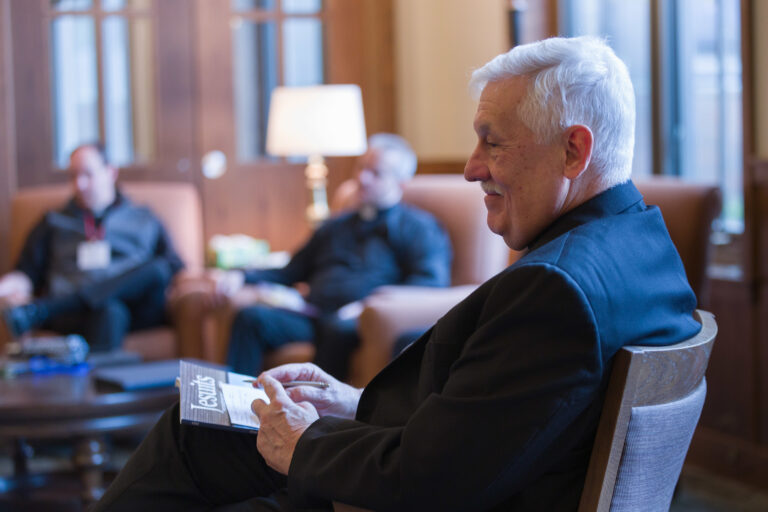Team seeking Engagement Planning Team volunteers
Marquette University today announced the kickoff of a new university-wide strategic planning process to develop an actionable plan for 2024-30. Rooted in Marquette’s mission, vision and Guiding Values, and strategically aligned with the Campus Master Plan and Campaign, the Strategic Planning 2030 effort will chart the university’s direction up to the next decade, according to President Michael R. Lovell. Planning efforts begin now, with the new strategic plan expected to be unveiled in early 2024.
“The landscape of higher education has changed drastically since our current strategic plan, Beyond Boundaries, was first developed, and it continues to evolve today,” President Lovell said. “Over the past nine years, we have transformed our campus and we executed on the majority of the priorities outlined in Beyond Boundaries. Now is the time to refocus and develop strategies that will position Marquette for success in 2030 and beyond. Through a strategic planning process that incorporates input from all of the Marquette community, we will chart a fresh course that we can all enthusiastically embrace. Developing a new strategic plan will help ensure that Marquette delivers a transformative education to our students that is grounded in our Catholic, Jesuit values for decades to come.”
Leading the effort will be a Strategic Planning 2030 Core Team, chaired by Dr. Jeanne Hossenlopp, vice president for research and innovation, and comprising the following individuals from across the university who will meet monthly:
- Allison Abbott, associate professor of biological sciences; chair, University Academic Senate
- John Baworowsky, vice president for enrollment management
- Joya Crear, assistant vice president for student affairs
- Ian Gonzalez, vice president for finance
- Calley Hostad, multi-media manager, Diederich College of Communication
- Paul Jones, vice president for university relations and general counsel
- Tim McMahon, vice president for university advancement
- Chris Navia, vice president for inclusive excellence
- Jennifer Ohlendorf, associate professor of nursing
- Lora Strigens, vice president for planning and facilities management
- John Su, vice provost for academic affairs and student success
- James Voiss, S.J., vice president for mission and ministry
- Doug Woods, vice provost for graduate and professional studies and dean of the Graduate School (Academic Affairs lead)
The Core Team will secure regular input from campus governing bodies and other key groups, including the University Leadership Council, University Academic Senate and University Staff Senate, alumni, trustees and an external consultant, along with a new Strategic Planning Engagement Planning Team that is being formed (see additional information below).
The Strategic Planning 2030 Core Team will partner with the Executive Leadership Team to write the university’s new strategic plan. The Core Team will lead efforts to develop engagement and communication plans; seek input from campus stakeholders; develop SWOT and gap analyses; and help draft and finalize the plan to be submitted to the Board of Trustees for approval.
Get involved: Faculty, staff, students invited to join volunteer Engagement Planning Team
The Core Team is also seeking volunteers to join an Engagement Planning Team, which will provide valuable insights from different campus constituencies aimed at ensuring the process is engaged and inclusive. Members of the Engagement Planning Team will provide advice and assistance in creating stakeholder engagement opportunities, as well as feedback on ideas and drafts from the Core Team.
This volunteer opportunity is open to all faculty, staff and students. To volunteer, please email the Strategic Planning 2030 Core Team at StrategicPlan2030@marquette.edu.
A set of Frequently Asked Questions follows. Watch Marquette Today for updates on Strategic Planning 2030 efforts.
FREQUENTLY ASKED QUESTIONS
How was the Core Team identified?
The Core Team comprises individuals from all areas of the university who offer the expertise necessary to make decisions quickly and nimbly enough to launch a new plan in early 2024. The Core Team will regularly solicit input from faculty, staff, students, alumni, trustees, community partners, corporate partners and other key stakeholders throughout the process. Further, the Engagement Planning Team will help identify stakeholders who the Core Team should seek input from and plan the best ways to do that. All faculty, staff and students are invited to be a part of that volunteer team. To volunteer, please email the Strategic Planning 2030 Core Team at StrategicPlan2030@marquette.edu.
What happens to the current Beyond Boundaries plan?
The current Beyond Boundaries strategic plan, which was originally approved by the Board of Trustees in May 2013 and revisited in 2015, will remain in place until the new plan is approved by the trustees and shared with the campus community (targeting early 2024). The Beyond Boundaries Steering Committee has been charged with identifying key priorities that should be completed by December 2023, recommending unmet objectives that should be considered for inclusion in the new plan and summarizing the accomplishments of the Beyond Boundaries plan.
What is the timing for the new strategic plan? What timeframe will the plan cover?
The new plan is scheduled to launch in early 2024 and is anticipated to serve as the university’s plan through 2030. The plan will be evaluated annually, and updates will be made, as necessary and prudent to do so.
Who will develop the new strategic plan?
The Core Team will partner with the Executive Leadership Team (president, provost and EVP/COO) in developing the plan.
Will the name Beyond Boundaries and its six strategic plan themes remain?
The Beyond Boundaries name and themes will not continue. The new name and format of the plan will emerge from the planning process. The university’s five strategic priorities accepted by the Board of Trustees in September 2021 — Student Success, Research, Enrollment, Graduate and Online Programs, and Stewardship of Resources — will serve to focus planning efforts, with the potential for additional focus areas to emerge. Marquette’s mission, vision and Guiding Values, and its commitment to diversity, equity and inclusion will serve as the foundation for all planning.
Why are we utilizing an external consultant to help with strategic planning?
An external consultant will provide a rigorous and unbiased external review (environmental scan) of the higher education landscape and assist with evaluating how Marquette is situated relative to this external context.
What happens to any incomplete tactics outlined in Beyond Boundaries?
Most of the tactics outlined in Beyond Boundaries have been completed — read about some of the Beyond Boundaries implementation highlights on Marquette Today. The Beyond Boundaries Steering Committee has been charged with identifying key priorities that should be completed by December 2023 and recommending unmet objectives that should be considered for inclusion in the new plan.
How will the campus community be kept informed of the strategic planning process?
At the onset of the process, the Core Team will lead efforts to develop engagement and communication plans. A dedicated communication liaison from the Office of University Relations has been assigned to work closely with the Core Team, including attending their monthly meetings. The OUR liaison will work to develop a robust and comprehensive communication plan that includes a regular cadence of updates to the campus community, primarily through Marquette Today, the university’s primary internal communication vehicle, as well as other available modalities.
How will college and unit strategic plans align with the new strategic plan?
College strategic plans have recently been updated to reflect analysis of the unit’s contributions to the university’s strategic priorities. As part of the implementation of the new strategic plan, updated expectations for alignment with college and unit level plans will be developed.




